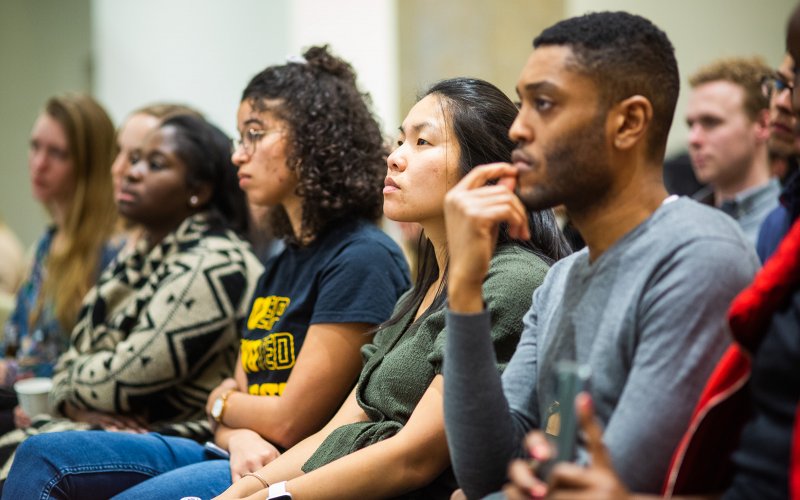PUMP is Primed for Mentoring Psychology Students toward Graduate Study

ALBANY, N.Y. (March 9, 2021) — UAlbany, like many universities in the country, has made concerted effort to build up the ranks of students of underrepresented populations in its graduate schools. To this end, in 2016 Psychology graduate students, with the aid of faculty, formed the Psychology Undergraduate Mentoring Program, or PUMP.
The process and progress of their organization has now been documented in an academic article, “Addressing Disparities in Professional Psychology through Undergraduate Mentorship: Lessons Learned and a Call to Action,” in the open-access publication The Behavioral Therapist.
It details how the program “aims to support students and address inequities in higher education and in professional psychology,” said Maha Mian, a Clinical Psychology graduate student and one of the authors of the article. “We are quite proud of our program and are delighted to have the opportunity to share this initiative with other psychology training programs.”
A Quest to End Inequity
The paper points out that the field of psychology “holds a complicated history of both promoting a system of inequity and fighting against racism,” with the percentages of psychology health services providers identifying as Asian, Hispanic and Black only 5, 5 and 4 percent, respectively, according to the American Psychological Association.
“At present, I would say that psychology attracts a lot of diverse people, but does not always hold onto them,” said Mian. “Clinical psychology, in particular, because of inequity in opportunities, networking, test-taking, etc., ends up with a pretty white field at the end of the day.”
The article posits that undergraduate students in psychology require guidance beyond such worthwhile programs as peer mentorship and faculty advisement, and as early in their careers as possible, to transition into graduate study. UAlbany undergrads in psychology, according to the article, wish to know more about the graduate admissions process (45.9%), post-graduate options (47.5%), networking (26.2%), job/internship guidance (8.2%) and research opportunities (6.6%).
The article noted that programs like PUMP “represent a low-cost and accessible intervention to mitigate racial and ethnic disparities in the training-to-workforce pipeline.” More, it found experiential value for the grad student mentors themselves, and that PUMP “creates a sense of community and collaborative environment which can create benefits that can be felt throughout a department.”
The Birth and Growth of PUMP
Joseph Donahue, PhD ’20, a post-doctoral fellow at the University of San Diego and a UAlbany lecturer, created PUMP as a Clinical Psychology grad student in 2016 to improve the mentorship experience in psychology. “Joe was incredible,” said Mian. “He started this program from scratch, essentially on his own, and ran it as well. At the time it was largely clinically focused, with some counseling mentors.”
PUMP’s focus began to expand, with a big assist from Mian, who entered UAlbany in Fall 2017. She mentored in PUMP for a year and then Donahue passed its directorship over to her, a post she held until Summer 2020.
“When I became lead, I noted that a lot of undergraduates were expressing interest in other areas of psychology,” she said. “I started recruiting graduate students from other psychology programs — industrial/organizational, social, cognitive, school — and from students in other departments, such as social work, mental health counseling and educational psych.”
Last year, Donahue approached Mian about producing the Behavioral Therapist article, of which he is lead author.
“It made sense to me that the article be a collaborative effort” said Mian, who aims to graduate in summer 2022. “We looped in Dela (Adela Scharff, current PUMP director), as well as several faculty members, including Hazel Prelow, who was the original faculty advisor and sponsor of the program, Julia Hormes, our current faculty advisor, and Elena Gordis, who is our director of clinical training. Everyone was super enthusiastic about contributing.”
Scharff, who plans on a 2023 graduation, said that PUMP continues to grow, with 50 very engaged new and experienced mentors serving about 60 students. “I would estimate that over half of our mentors identify with underrepresented racial/ethnic groups, as first-generation students, or with sexual and gender minority identities”
As did Mian, Scharff will continue efforts to gather feedback to improve both the program itself and ways of getting the word out to potential applicants – both mentors and mentees. She also wants to keep the grad mentorship movement at UAlbany growing. “I hope to reach out to the School of Social Welfare and see if we can get Social Work graduate students involved in the future as well,” she said.




